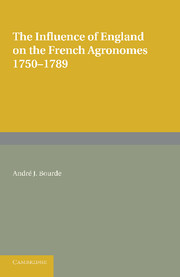Book contents
- Frontmatter
- Contents
- LIST OF ABBREVIATIONS
- Preface
- PART ONE THE PREPARATORY PERIOD 1700–50
- PART TWO DUHAMEL DU MONCEAU'S WORK
- PART THREE AGRARIAN REPERCUSSIONS OF THE NOUVEAU SYSTÉME
- PART FOUR HOW THE NEW HUSBANDRY WAS INTENDED TO ENRICH FRENCH AGRICULTURE
- PART FIVE SOME ASPECTS OF THE INTERNAL LIFE OF THE AGRONOMIC MOVEMENT
- Chapter XII How the Agronomes obtained their Information about England, 1750–89
- Chapter XIII Practical Undertakings of the Agronomes
- Conclusion
- Appendix I
- Appendix II
- Bibliography
- Index
Chapter XII - How the Agronomes obtained their Information about England, 1750–89
from PART FIVE - SOME ASPECTS OF THE INTERNAL LIFE OF THE AGRONOMIC MOVEMENT
Published online by Cambridge University Press: 05 June 2016
- Frontmatter
- Contents
- LIST OF ABBREVIATIONS
- Preface
- PART ONE THE PREPARATORY PERIOD 1700–50
- PART TWO DUHAMEL DU MONCEAU'S WORK
- PART THREE AGRARIAN REPERCUSSIONS OF THE NOUVEAU SYSTÉME
- PART FOUR HOW THE NEW HUSBANDRY WAS INTENDED TO ENRICH FRENCH AGRICULTURE
- PART FIVE SOME ASPECTS OF THE INTERNAL LIFE OF THE AGRONOMIC MOVEMENT
- Chapter XII How the Agronomes obtained their Information about England, 1750–89
- Chapter XIII Practical Undertakings of the Agronomes
- Conclusion
- Appendix I
- Appendix II
- Bibliography
- Index
Summary
After an attempt to point out the main fields of the agronomic literature, in which the influence of English agriculture is particularly noticeable, it is now time to show how this knowledge was practically acquired, how the interest which had manifested itself even before 1750 was maintained and increased with the Revolution, in what manner the agronomes made contact with British specialists, and which were the channels they used—in one word, the framework on which the movement of agricultural research rested. Marc Bloch very rightly said that studying the history of a technique, means studying that of contacts between minds.
The knowledge of the agronomes was not derived exclusively from books. Many actually knew the country of which they were speaking, or had at least come in contact with its inhabitants, in one way or another.
It seems that England was better known than some agronomes realized. Towards the end of the ancien régime, travel to England became one of the rules for cultivated Society. Following the example given by the English themselves, the French more frequently undertook the crossing of the Channel. Fashion created closer links between the aristocratic circles of the two countries, so that a better understanding of both civilizations became possible. The propaganda spread by anglomane travellers in France had positive results, and account has been taken of these exchanges in the fields of literature, politics and society. Very little, however, has been said about its economic consequences, and practically nothing exists from the agricultural point of view. In the superficial lists drawn up by Mr Lockitt or Miss C. Maxwell we can find one or two names, vaguely related to the economic activity of the period: Adam Smith for instance and the inevitable Arthur Young, who might almost seem at times to have been the only agricultural traveller of his day.
In fact, however, between 1750 and 1791, there is a continuous exchange of agronomes and agricultural scientists between England and France, which enables us, to some extent, to check up the conclusions of French agricultural literature, or at least to explain the diffusion and fashion of English methods in those times. Detailed accounts of these travels, Young's excepted, hardly exist as such.
- Type
- Chapter
- Information
- The Influence of England on the French Agronomes, 1750–1789 , pp. 179 - 199Publisher: Cambridge University PressPrint publication year: 2013



